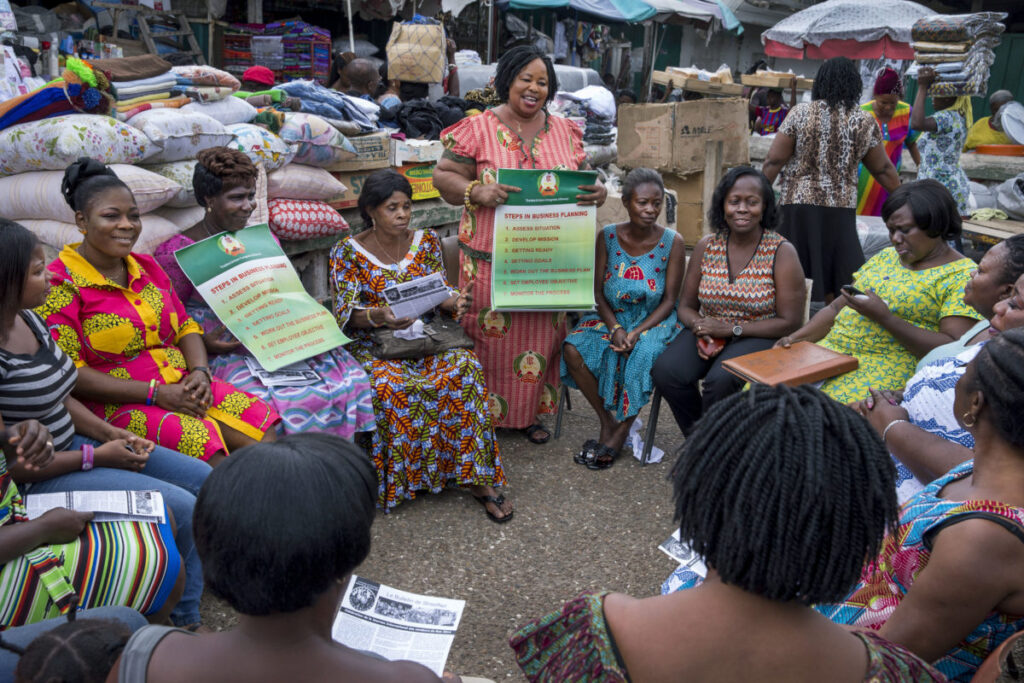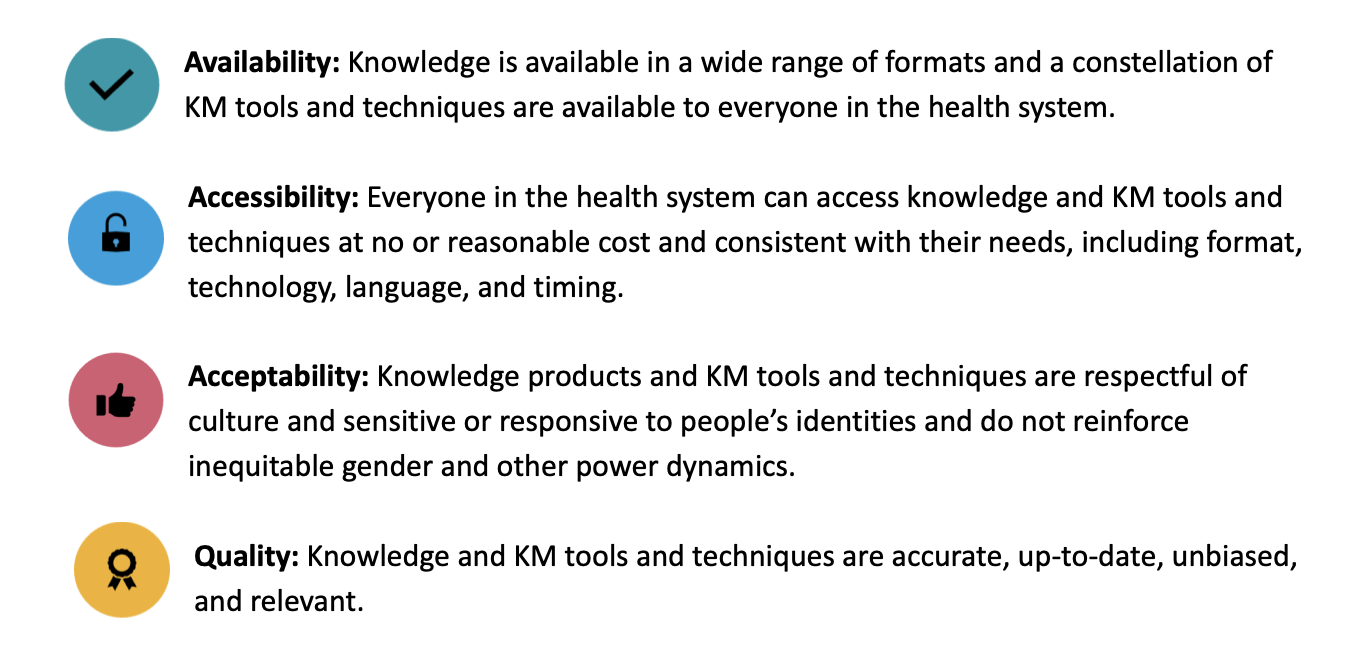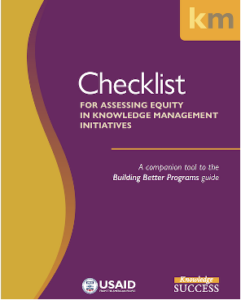Equity: What Does It Look Like in Knowledge Management?

At Knowledge SUCCESS, we work closely with family planning and reproductive health (FP/RH) projects around the world to support their knowledge management (KM) efforts—that is, to share what works and what doesn’t work in programs, so we can learn from each other, adapt and scale up best practices, and avoid repeating past mistakes.
FP/RH programs have a strong emphasis on eliminating inequities. For example, programs have noted that achieving universal health coverage “entails making services, including sexual and reproductive health care, available to people who have been excluded from them because of cost, gender or geography” (UNFPA 2017).
Issues of equity are also an important consideration for the KM systems and initiatives that support FP/RH and global health programs. For example:
- Do facilitators, moderators, speakers, hosts, and panelists of webinars and other learning exchange events reflect diverse backgrounds or perspectives?
- Do FP/RH professionals have opportunities to share and discuss in the languages they are most comfortable using?
- Do authorship policies exclude the contributions made by certain groups of the health workforce, such as researchers in low- and middle-income countries who are often the people collecting the data that informs research articles?
- Do KM initiatives budget appropriately to incorporate equitable elements, such as translation or interpretation services and printing or digital costs?
- Are roles and responsibilities distributed equitably among KM team members?
We believe it’s important to engage, include, and value the ideas, skills, and experiences of all members of the health workforce to inform program development and implementation and to reshape the systems in which we work, including our KM systems. Believing in this is one thing … putting this into practice takes intentional efforts and actions. Starting with a shared definition of what equitable KM means can help.
What Does Equity in KM Mean?
We define equity in KM as “the absence of unfair, avoidable, and remediable differences in knowledge creation, access, sharing, and use among groups of health workforce members, whether those groups are defined socially, economically, or environmentally.” If you’re familiar with the WHO definition of health equity, our definition of equity in KM might sound familiar to you. We’ve adapted WHO’s definition in recognition that some groups of health workforce members may need more support or resources to define and participate in the KM cycle and to achieve the same KM outcomes as other groups with historically more power and privilege. Further, similar to the four essential elements of health services, we define four essential elements of KM tools and techniques:

Examples of Equitable KM Interventions
The Pitch Season 2 KM Innovators provide concrete examples of how we can make quality KM interventions available and accessible, using methods that are acceptable and relevant to their intended audiences (see table). The Pitch is a global competition hosted by Knowledge SUCCESS that provides funding to start or scale KM initiatives in select countries in sub-Saharan Africa and Asia.
In Season 2, five organizations based in India, Kenya, Madagascar, Nepal, and Nigeria implemented KM interventions in creative and context-specific ways to ensure that family planning data, information, and guidelines were accessible, shared, and used by key stakeholders in FP/RH programs. For example, Strong Enough Girls Empowerment Initiative hosted a podcast with indigenous young people while Blind Youth Association Nepal created disability-inclusive FP/RH guidelines.

During a consultation workshop, Blind Youth Association Nepal (BYAN) engaged people living with disabilities to inform the development of disability-inclusive FP/SRH guidelines. © BYAN 2022
| The Pitch KM Innovator | KM Innovation | How they integrated equity |
| Blind Youth Association Nepal | Guidelines on Disability Inclusive FP/SRH Services (Nepali | English) | ● Sought to reduce barriers to accessing FP/SRH services for people living with disabilities by developing disability-responsive guidelines for service providers and government officials.
● Trained 1,000+ providers on the guidelines through cascade training |
| Population Foundation of India | Hindi Language FP/SRH Resource Bank (Hindi | English) | ● Bridged the knowledge gap about FP/SRH among the media in Hindi-speaking North India states by translating verified data and information into Hindi.
● Facilitates greater awareness among journalists, decision makers, civil society organizations, community groups, frontline workers, and the population at large about FP/SRH needs and services |
| Project Jeune Leader (Madagascar) | Ampitapitao! (“Pass It On!”, a print and digital magazine) (Issues) | ● Shared community feedback about youth FP/RH with national decision makers, through a new print and digital magazine series
● Available in French and Malagasy, creating a critical feedback loop between local communities and national decision makers |
| Save the Children Kenya | Centralized FP Data Dashboard | ● Transforms complex data into easy-to-interpret analytics that national, county, and sub-county program managers and other FP/RH professionals can put into action |
| Strong Enough Girls’ Empowerment Initiative (Nigeria) | Indi-Genius Podcast (Episodes)
|
● Positioned indigenous young people in Nigeria and the Republic of Niger as problem-solvers and FP experts to bridge the gap in information sharing and access between Anglophone and Francophone Africa
● Included a diversity of languages (such as Igbo and Pidgin), beyond the typical colonial languages of English and French |
Hear more about these innovations by watching the recording of a webinar on equitable approaches and tools in knowledge management.
How Can We Integrate Equity Into Our KM Initiatives?
Knowledge SUCCESS developed a practical checklist (in English and French) to help FP/RH and global health teams—including our own Knowledge SUCCESS team—assess and achieve equity in KM initiatives. The Checklist for Assessing Equity in Knowledge Management Initiatives includes broad systems considerations, such as team roles, operations, norms, and resources, as well as considerations for each of the five steps in the KM Road Map for global health programs: 1) Assess Needs, 2) Design Strategy, 3) Create and Iterate, 4) Mobilize and Monitor, and 5) Evaluate and Evolve. For example, the goal of Step 3 is to develop new KM tools and techniques, or tailor existing tones, to facilitate information sharing and use and achieve the KM objectives to support your FP/RH or global health program. The checklist includes key questions to ensure your KM tools and techniques are available, accessible, acceptable, and of high quality for all members of your intended audience.
help FP/RH and global health teams—including our own Knowledge SUCCESS team—assess and achieve equity in KM initiatives. The Checklist for Assessing Equity in Knowledge Management Initiatives includes broad systems considerations, such as team roles, operations, norms, and resources, as well as considerations for each of the five steps in the KM Road Map for global health programs: 1) Assess Needs, 2) Design Strategy, 3) Create and Iterate, 4) Mobilize and Monitor, and 5) Evaluate and Evolve. For example, the goal of Step 3 is to develop new KM tools and techniques, or tailor existing tones, to facilitate information sharing and use and achieve the KM objectives to support your FP/RH or global health program. The checklist includes key questions to ensure your KM tools and techniques are available, accessible, acceptable, and of high quality for all members of your intended audience.
How Knowledge SUCCESS Has Been Using the Equity Checklist
Our own teams have been implementing the equity checklist in different ways. For some teams, their members complete the checklist individually and then meet as a group to discuss their results while other teams complete the checklist together as a group. In general, our teams complete the checklist from start to finish to provide a “baseline” of equity integration into their KM processes. From that baseline, they identify priority actions they need to take to improve equity integration and meet periodically to assess progress. As the checklist takes you through the systematic KM Road Map process, it allows teams to complete it at the beginning stages of implementing a KM activity, in the middle to see how milestones are changing, and at the end to take stock.
So, what did we learn from this exercise? In general, our teams all voiced a need to create time and space for these types of discussions. They all agreed that it was especially critical to have these discussions before starting any new KM initiative or activity. It can be easy, when there’s a lot of to-do items to get an activity up and running, to overlook some key questions such as whether we’re ensuring gender diversity among selected participants of our KM events or to consider who we are not reaching with our chosen approaches. The equity checklist can help to keep these issues front and center as new activities unfold.
We’ve recapped some of our main areas of strengths and opportunities for growth below.
What are we already doing well around equitable KM?
- Web accessibility: Knowledge SUCCESS websites, tools, and platforms are designed with accessibility in mind to make sure people with disabilities can access FP/RH resources. For example, we always include alt text in web images, making it easier for users with screen-readers to read our content and we recently just published the first audio version of a blog post so that people can listen instead of reading.
- Language inclusivity: The Knowledge SUCCESS and FP insight websites have auto-translate features available for multiple languages. Our content is often translated by human translators into French and we always offer simultaneous interpretation into French for our webinars since francophone FP/RH professionals are one of our key audiences. We are also aware of the need to include more diverse and non-colonial languages and are part of this conversation in the global health space.
- Authorship of content and images: We give credit to all individuals who had a role in conceptualizing, contributing to, or writing content pieces, and we always ask for consent when taking pictures during online and in-person events and when sharing images.
What can we do to ensure a more equitable KM?
- Disabilities: To ensure our online events and other knowledge sharing opportunities are as inclusive as possible, we want to ask participants when they sign up for an event if they have any accommodation need that we should take into account.
- Diversifying partnership: We aim to partner with more groups that are founded and based in the countries of implementation of our geographic areas of focus. Again, we are asking ourselves, who are we missing?
- Co-creation: We have had great experience with co-creating knowledge solutions with FP/RH professionals and want to continue supporting and strengthening similar opportunities that are inclusive and representative of FP/RH professionals’ needs and preferences.
For more guidance on how to integrate equity in KM, check out the related training module in the KM Training Package for Global Health Programs. We hope other FP/RH programs and global health organizations can benefit from the guidance and tools we’ve developed, including the Checklist for Assessing Equity in KM Initiatives. We invite readers to share their comments and suggestions on the checklist, in particular, to help inform future updates of the checklist as we continually evolve on our journey toward equitable KM.




